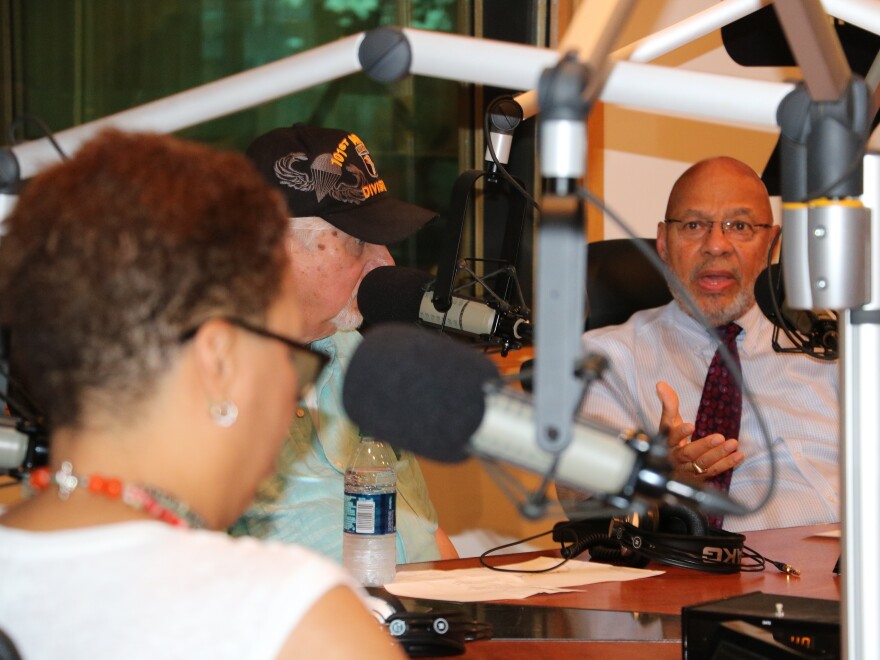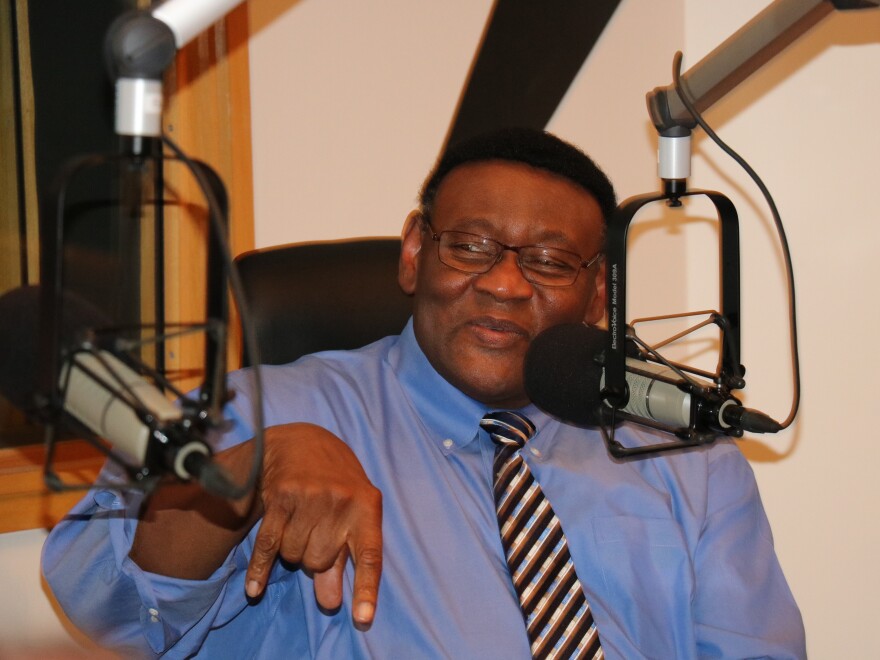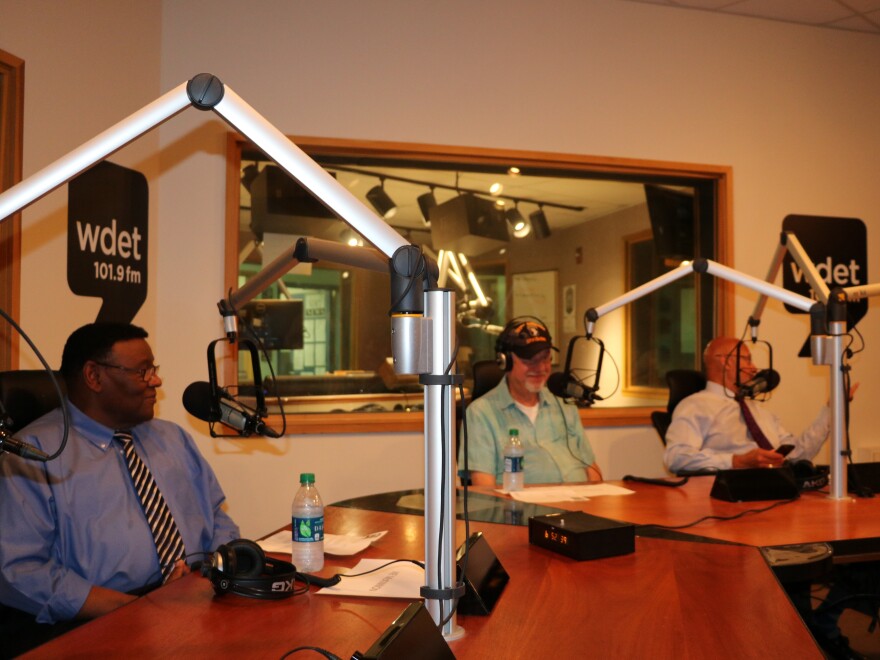Detroit has faced a tumultuous past, but the most painful week in Detroit's modern history arguably happened exactly 50 years ago. On July 23, 1967, after decades of discrimination, poverty, and mistreatment by police, many black citizens of Detroit erupted in violence. Some call that five-day period of burning and looting the "riots;" others call it the "uprising" or the "rebellion."
Detroiters have had 50 years to contemplate the reasons for the civil unrest, and at our Going There event at WDET in Detroit, NPR's Michel Martin spoke with three guests who remember where they were when the five-day rebellion started. They spoke with Michel about how that week of unrest changed their relationship with the city of Detroit, what impact the rebellion had on the city, and what the future holds.
Dennis Archer is former mayor of Detroit and a former Michigan Supreme Court judge. Ike McKinnon was one of the first African-Americans on the Detroit police force, and ultimately became police chief. Dennis Coffey is a former session guitarist for the Motown record label, and was in studio recording an album when someone came running to tell him the city was burning.
You can listen to the entire interview here, or the condensed version that aired on All Things Considered in the player above.

Interview Highlights
On how the cops were told to deal with the civil unrest
McKinnon:Go out and lock people up. We were woefully unprepared to handle what occurred. We had received no training. And we could not have handled the situation because at that time we had close to 1,600,000 people [in Detroit]. And if you have 5,500 police officers — and all of us were not on duty at one time — and if we try and stop a rebellion as such, or people looting, it was impossible to do so. So we were undermanned to handle this.
On the roving police squads that terrorized the city
Coffey: Back in the mid-50s, they had two patrolmen in the front and two detectives in the back, and the detectives in the back had shotguns. And so they rolled down the window and said, "What are you guys doing?" Well, we're walking home from school. And they said, "Do you know there's an ordinance? You can't have more than two people in a group." And we said, "Yes sir." Because the reputation — when they said do something, you did it.
McKinnon: I'd seen this before of other young men, but never to me. And at this point they grabbed, threw me up against the car, and proceeded to beat me. And I was, "But sir, but sir!" I'm asking — and the more I ask, the more they beat. And the look of anger — extreme anger — on these officers' face, with the name-calling and beating. And they were good at what they did, I should tell you. They beat me between my neck and my belt. And toward the end of it — I'll never forget this — they said, "Get your black ass out of here." And I ran home. And I never told my parents. ...[T]he reason being if you told your parents, they would go to the precinct and they would get locked up or beaten also.
On the cause of the rebellion
Archer: You've heard the explanation already, in terms of what people of color and whites as well were subjected to. But let's talk about economics. The federal government would not allow blacks to have mortgages. You couldn't live in certain neighborhoods. And when you consider that you couldn't go into certain restaurants, and certain hotels and businesses if you happened to be black. ... When people are able to live and they're comfortable, and they're able to do what they pretty much want to do... you take that away, and you strip people of hope or dignity and the like? You set up an environment that can be explosive.
On how white cops brutalized black cops

McKinnon: After about an 18-hour shift, I came off at the Chicago Boulevard and made a left turn, and as I passed the overpass to the freeway, these two white police officers pulled me over. And I was in uniform — had my shield on — people think it's a badge but it's a shield. I had my "2" for the precinct I was at. And you could clearly see I was a police officer. I was stopped by these two white police officers — one was an older guy with gray hair - but he got out of the car with his partner. And they said to me, "Get out of the car."
I said, "Police officer! Police officer!" And I smiled, the way I am right now. And as I stepped out of the car, the officer with the short stub-nosed silver gun, he said, "Tonight you're gonna die." And he didn't stop there; he said the N-word. And I looked at him, and I couldn't believe this was happening. And as I looked at him, it was as if time froze. And when time freezes — and when there are exceptional circumstances — your senses are heightened. And I could see his finger pulling the trigger. And as I dove back into my car he started shooting at me.
Archer:If we could invite in the 100 or so police officers who were African-American who were working in their precincts, you would hear a lot of similar stories, in terms of how guns were pulled on them in the precincts, and how they were fussed at, cussed at, and white officers saying, "I'm not going to ride with that blankity-blank."
... And then I would just ask us to speed forward for a moment, and then you wonder why there's a group called "Black Lives Matter." And why those issues are very relevant today, as they were back then. And then when you start thinking about what we're hearing in terms of the divisiveness that's being openly talked about today, it hurts our country, it hurts our cities, it hurts people and it hurts all of us.
NPR's Stacey Samuel edited this story for Radio. NPR's Ashley Young produced this for radio. NPR's Maquita Peters produced this story for the Web.
Copyright 2021 NPR. To see more, visit https://www.npr.org. 9(MDAxODg3MTg0MDEyMTg2NTY3OTI5YTI3ZA004))





